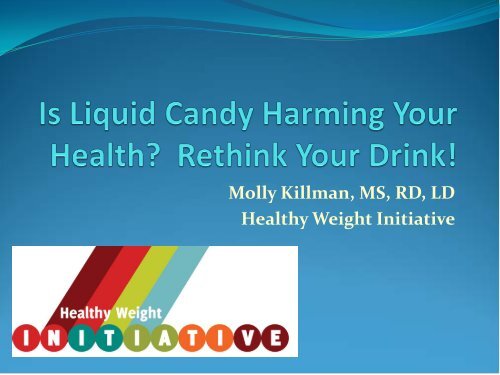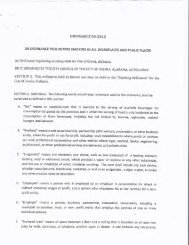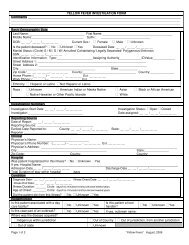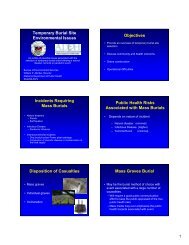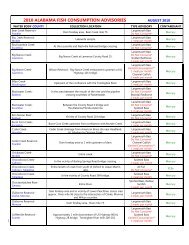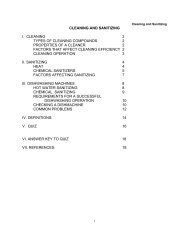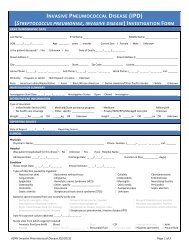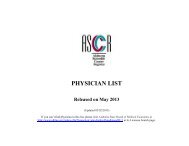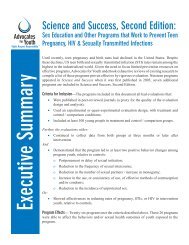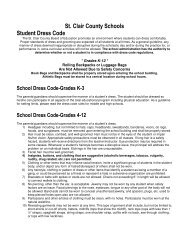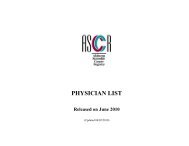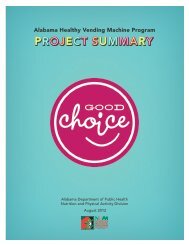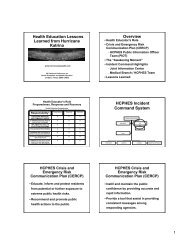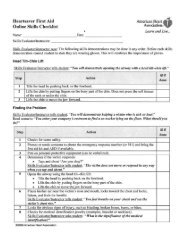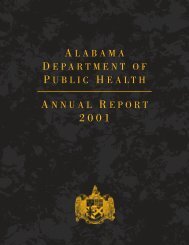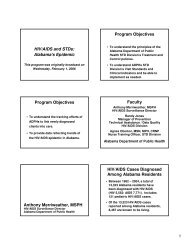Is Liquid Candy Harming Your Health? - Alabama Department of ...
Is Liquid Candy Harming Your Health? - Alabama Department of ...
Is Liquid Candy Harming Your Health? - Alabama Department of ...
You also want an ePaper? Increase the reach of your titles
YUMPU automatically turns print PDFs into web optimized ePapers that Google loves.
Molly Killman, MS, RD, LD<br />
<strong>Health</strong>y Weight Initiative
Sugar<br />
• In the news…
Sugar
Sugar<br />
• A food component to reduce – 2010 US Dietary<br />
Guidelines
Sugar<br />
• Added sugars vs. naturally occurring sugars<br />
• Natural sugars<br />
• Supplies nutrients
Sugar<br />
• Added sugars<br />
• Empty calories, no nutrients<br />
• Supply calories only
Sugar<br />
• Added sugars contribute an average <strong>of</strong> 16% <strong>of</strong> total<br />
calories in the American diet
Sugar<br />
• How much is recommended<br />
• American Heart Association = 6-9 teaspoons/day (100-<br />
150 calories)<br />
• Currently consuming approximately 22 teaspoons/day<br />
• About 355 calories per day<br />
• Teens consuming more! (NHANES data)
Sugar<br />
• 3-4 teaspoons/day for children recommended
Sugar<br />
• What are the food sources
Soda<br />
• 20 ounce soda = 16 teaspoons <strong>of</strong> sugar<br />
• 65 grams <strong>of</strong> sugar
Sugar Sweetened Beverages
Sugar Sweetened Beverages<br />
• Soda……. what else<br />
• Definition:<br />
• Yale Rudd Center<br />
- Any beverage with added caloric sweetener<br />
• CDC<br />
– Sodas, fruit drinks, sports drinks, energy drinks, tea and<br />
c<strong>of</strong>fee drinks, sweetened milk or milk alternatives, and any<br />
other beverages to which sugar has been added<br />
• •National Cancer Institute<br />
- Sodas, fruit drinks, sports drinks, energy drinks, and<br />
sweetened bottled waters
Beverage Consumption
Beverage Consumption<br />
• <strong>Alabama</strong>’s Youth
Beverage Consumption<br />
• YRBS Data from CDC<br />
• 19.5 % <strong>of</strong> AL Youth consumed soda 3 or more times per<br />
day (diet sodas are not included)<br />
• Tied with Mississippi for first place!<br />
• Males 24%<br />
• Females 15%<br />
• National Average 11.3%
Beverage Consumption<br />
• National Average for milk consumption<br />
• 3 or more glasses per day<br />
• Only 15%
Obesity<br />
• YRBS Data from CDC<br />
• AL Youth<br />
• 17% are obese<br />
• Ranked #1 in the US<br />
• AL Adults<br />
• 33 % are obese<br />
• Ranked #2 in the US
Beverage Consumption<br />
• Limiting the intake <strong>of</strong> sugar sweetened beverages is<br />
one approach to preventing obesity and chronic<br />
disease<br />
• Several national and state initiatives promote this as a<br />
strategy
American Academy <strong>of</strong> Pediatrics<br />
• Sports drinks have a limited function for pediatric athletes;<br />
they should be ingested when there is a need for rapid<br />
replenishment <strong>of</strong> carbohydrates and/or electrolytes in<br />
combination with water during prolonged, vigorous<br />
physical activity.<br />
• Routine ingestion <strong>of</strong> carbohydrate-containing sports drinks<br />
by children and adolescents should be avoided or<br />
restricted, because they can increase the risk <strong>of</strong> overweight<br />
and obesity, as well as dental erosion.
American Academy <strong>of</strong> Pediatrics<br />
• Energy drinks pose potential health risks because<br />
<strong>of</strong> the stimulants they contain, and should never<br />
be consumed by children or adolescents.<br />
• Water, not sports drinks, should be the principal<br />
source <strong>of</strong> hydration for children and adolescents.
<strong>Alabama</strong> <strong>Department</strong> <strong>of</strong> Public<br />
<strong>Health</strong>
<strong>Alabama</strong> <strong>Department</strong> <strong>of</strong> Public<br />
<strong>Health</strong>
Resources<br />
• New CDC website – www.cdc.gov/healthyyouth/npao<br />
• Click on Water Access in Schools<br />
• Information on the <strong>Health</strong>y, Hunger-Free Kids Act
Resources<br />
• Beverage Bulletin<br />
• CDC sends out a monthly Beverage Bulletin, an<br />
electronic resource for practitioners interested in<br />
public health efforts to support healthier beverage<br />
intake. To subscribe to this listserv, email Beverly<br />
Kingsley at bbk9@cdc.gov.
Resources<br />
• Drink Water First – www.drinkwaterfirst.com
Resources<br />
• Southeastern Dairy Association -<br />
www.southeastdairy.org
Thank you!<br />
• Questions<br />
• Molly Killman<br />
• Molly.killman@adph.state.al.us<br />
• 334-206-5646


